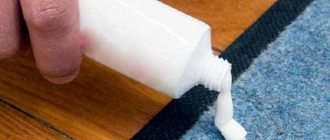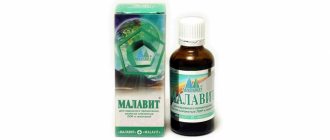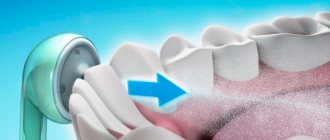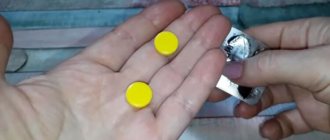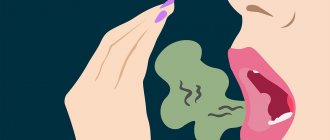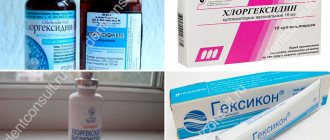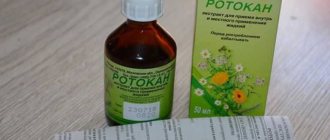Daily hygiene of teeth and gums includes rinsing the mouth with special solutions. Rinse aids can be purchased at pharmacies, or you can prepare them yourself. Their use ensures cleaning of the oral cavity in hard-to-reach places, freshening of breath and destruction of certain types of pathogenic microorganisms. You can easily make a mouthwash with your own hands, and this will be the right decision when you are intolerant to chemical components and want to make your dental hygiene as safe as possible.
Let's figure out where in everyday life you can use Listerine mouthwash.
On the shelves of stores and pharmacies there are many bright bottles with the inscription: “Mouthwash.” Everyone knows that this product works for its intended purpose - it refreshes the oral cavity, destroys bacteria, and makes breath fragrant. But few people realize that mouthwash can be used for many more simply incredible cases.
The most common breath freshener in the world is Listerine, created back in the late 19th century. Now it is produced by Johnson & Johnson, a world leader in the production of hygiene products and household chemicals. Listerine contains ingredients that have a powerful bactericidal effect: essential oils of eucalyptus, menthol, salicylic acid, thymol. The drug copes with herpes and influenza viruses, treats stomatitis.
Before Listerine started killing germs in the mouth, it killed bacteria on hospital floors and bathrooms. That's right, because in the late 1800s, Listerine was originally developed as a hospital-grade antiseptic for cleaning areas and instruments. And only then they began to use it as a “special pharmaceutical product for dentists.” It was typically marketed to consumers as an all-purpose cleaner used to disinfect floors and also treat feet and underarms.
The product was used as a disinfectant until the 1920s. Lambert Pharmacal then invented the bad breath "disease" known as halitosis and began marketing Listerine as a cure. For the creator of the product, Jordan Lambert, this was a profitable step - in just seven years, his company's revenue grew from 115 thousand to more than 8 million dollars.
Since then, people all over the world have been sweeping this single-use home cleaner off drugstore shelves and sprinkling it into their mouths in hopes that it will freshen their breath. Listerine can also be bought in Russian pharmacies, where its cost is very low.
Of course, you can continue to rinse your mouth with this “floor cleaner.” However, we decided to familiarize you with 16 more options for using mouth freshener with its terrible taste that we found on the Internet. This simple and accessible remedy may open up to you from a completely unexpected side. So, a mouth freshener can be used:
To disinfect the toilet
Seika Chujo/Shutterstock
This powerful bacteria killer can be used to both clean and disinfect your toilet. All you need is to buy Listerine mouthwash from the pharmacy and take a toilet brush. Pour a capful of liquid into the toilet and leave for 15 minutes. Use a toilet brush to remove dirt from the toilet rim, then flush. You will end up with a clean toilet. (For best results, use a mint scented product.)
Toothpaste preparation
Instead of advertised and not always effective store-bought products, use a toilet freshener made from regular paste.
- Feel free to choose the cheapest toothpaste with a strong mint flavor.
- To saturate your toilet room with mint amber, pierce a new tube with a needle on all sides and place it in the drain tank.
- Water evenly flows into the holes on the package, and until the paste runs out, a pleasant mint aroma will always remain in the room.
For washing clothes
Victoria Shapiro/Shutterstock
You can kill almost all bacteria on your clothes by adding mouthwash to the water the next time you wash them. Turn on the washing machine and let it fill with water. Before starting the cycle, pour one cup of mouthwash into the detergent container and continue washing as usual. Mouthwash will kill any germs lurking on your clothes.
Caution: Do not use mouthwash with natural or artificial dyes, which may stain your clothes.
Concentrated composition
It’s quite easy to make your own toilet freshener, which would be as concentrated as a store-bought one and would be no worse in its effect. Vinegar comes to the rescue in difficult cases. Prepare this way: a glass of water + ½ glass of vinegar + 5 drops of aromatic oils. Combine everything and place in a container with a spray bottle.
Vinegar will completely destroy all unnecessary odors, and essential oil will refresh the space.
For cleaning the washing machine
Shutterstock
You can use Listerine type rinse liquid to disinfect the washing machine itself.
Allow the washing machine to fill with water, add one cup of rinse aid, and run a full cycle. Your washing machine will eventually be completely free of germs. see also
16 Ways to Use Candles You Probably Didn't Know About
To combat dandruff
Doucefleur/Shutterstock
Listerine antiseptic contains active components of essential oils. This makes it ideal for killing fungi, particularly Malassezia yeast, which causes dandruff. To combat this scourge, mix half a glass of mouthwash and half a glass of water and pour into a spray bottle. Apply the solution to clean scalp and leave for five minutes, then rinse. The condition of your scalp will improve, the amount of dandruff will decrease, and your hair will smell like eucalyptus or menthol.
Benefits of home air fresheners
Is there any point in “reinventing the wheel” when preparing a flavoring agent if you can easily buy it in a store? There are three defining points:
- The home remedy is completely natural and does not contain any chemicals. As for store-bought analogues, there is an opinion that some options, which contain dyes and fragrances, can cause asthma.
- Economical. The cost of the drug in the store is about 110 rubles. And to make homemade flavoring, you will need much less money.
- Fight for the environment and saving resources. The bottle or vial can be used repeatedly.
So, having made sure of the feasibility of production, let's get to work.
To combat foot fungus
william casey/Shutterstock
A mouth disinfectant successfully “treats” not only the head, but also the legs. If you suffer from foot fungus, mix equal parts warm water, white vinegar and Listerine in a basin or bathtub. Make sure there is enough water to completely submerge your feet. Sit in this solution for 45-60 minutes to be sure to kill any bacteria. After this procedure, your feet will become soft and exude a fresh aroma.
Why is it necessary to create air fresheners with your own hands?
Anyone who cares even a little about the health of their loved ones has a question: “How do all these fresheners and “smells” affect the human body?” After all, you want to not only surround yourself with pleasant smells, but also be confident in their safety. This is especially true for young children and allergy sufferers.
The fact is that purchased fragrances and air fresheners contain petroleum products, which are carcinogens and pose a danger to our body and the health of pets. Aerosols pose the most danger - many of them not only contribute to the destruction of the ozone layer, but can also cause various diseases of the lungs, bronchi and other organs. Being in a room in which such a “freshener” has been sprayed is the same as being in a slow-acting gas chamber.
Therefore, the most correct option would be to make fresheners and flavors with your own hands from harmless and even healthy ingredients. There are many options, and even a child can prepare them.
This is how natural homemade air fresheners can look “tasty”
As a foot scrub
onegoodthingbyjillee.com
You can also make a foot scrub using a rinse to exfoliate dead skin. Mix one third cup Listerine, one third cup white vinegar and two cups white sugar. You can also add one tablespoon of coconut oil to soften and moisturize the skin and a few drops of essential oil for aroma (try to choose one that goes well with the smells of vinegar and Listerine). You can use this formula daily to keep your feet soft and looking perfect all the time.
How to do it - basic rules
There are several ways to make your own mouthwash. Mainly concerns the infusion of herbs, i.e. preparing a decoction, or mixing a prepared liquid base.
You can experiment and try the herbs and ingredients listed above to try to create a liquid that best suits your needs.
1 way. Bring water to a boil and add herbs. Choose the concentration as desired or brew as standard: a tablespoon per glass of boiling water. Leave for 20 minutes, cover with a lid and towel. Strain, cool, pour into a clean (preferably sterilized) bottle.
Method 2. Pour the herbs into a bottle and pour boiling water over it. Close and leave overnight. Strain in the morning.
Ready-made extracts, hydrolates, and purified water are often used. In this case, add the ingredients, including essential oils, to the bottle and shake.
Solid ingredients, e.g. salt, soda, it is better to first mix in a bowl, then dilute in water.
To prepare a decoction or infusion, it is advisable to use distilled or purified water. Tap water often contains chlorine, fluorine and other harmful compounds. Mineral will do.
As a facial toner
AliceCam/Shutterstock
Mouthwash contains an antiseptic, so it can be an effective astringent for the face. Pour a small amount of sugar-free mouth freshener onto a cotton pad or facial tissue and apply it directly to your skin. You can either spot treat each pimple or spot, or, if necessary, wipe the entire face with the product.
see also
20 Ways to Use Hand Sanitizer You May Not Know About
To remove odor from the trash can
Elly/Shutterstock
Don't let your trash can create an unpleasant odor in your home while it sits waiting for the trash to be taken out and thrown away. To prevent bad odor, you can use a small amount of mouthwash. Apply a small amount to a cotton pad or paper towel and throw in with the rest of the trash. As a result, there will be no unpleasant odor in the place where the garbage is located.
To clean the kitchen sink drain
Ari N/Shutterstock
Kitchen sinks, especially those equipped with a food waste disposer, can become a source of quite unpleasant odors if they are not cleaned regularly. This happens because food particles that end up in the drain can begin to decompose and smell accordingly. If you need to unclog your drain but don't feel like boiling water or reaching for vinegar and baking soda, you can simply pour a capful of mouthwash down the drain. This is a great product to kill bacteria and freshen drain odors.
Keep flowers fresh
Emily March Photography/Shutterstock
According to the gardening website Plantea, Listerine contains sucrose and a bactericide, ingredients that serve as food for plants and protect them from bacteria. Experts also note that Listerine's acidity "helps water move up the cut stem."
The next time you are presented with a bouquet of fresh flowers, make your own plant food at the rate of one teaspoon of mouthwash per liter of water and pour the mixture into a vase. As a result, your room will smell fragrant with long-lived flowers. Just do not use a rinse that contains ethyl alcohol, which is harmful to plants.
Is it possible to make irrigator liquid yourself?
You can prepare the liquid for the irrigator yourself from water, salt, soda or hydrogen peroxide. The saline solution is made from regular table salt without flavorings. You need to dissolve one teaspoon of the substance in a 300 ml glass of warm water. Instead of salt, you can take two teaspoons of soda or one bottle cap of hydrogen peroxide. These products have an antibacterial effect and are good at cleaning teeth from food debris. But they must be used with caution. The ingredients presented are aggressive. In high concentrations, they corrode gums and tooth enamel. It is better to use homemade solutions rarely: when the balm has run out and you haven’t had time to buy a new one. Make sure that the baking soda and salt are completely dissolved in the water, otherwise they may damage the device.
Get rid of sweat odor
siam.pukkato / Shutterstock
The antifungal and antibacterial elements of mouthwash work great outside of the mouth, too. They readily deal with bacteria that cause unpleasant body odor, so the rinse can be used as a deodorant. Soak a cotton pad or Listerine wipe and wipe underarms if necessary. Destroying bacteria will prevent the unpleasant smell of sweat from appearing.
To remove a bruise
Vladeep/Shutterstock
If you accidentally bump somewhere and feel that you will get a bruise, then mouthwash will help prevent it. Soak a cloth with an alcohol-based mouthwash and apply it to the affected area. Listerine will prevent you from getting a big bruise after bumping into your nightstand or bed in the middle of the night (or otherwise getting it).
Terms of use
How to use mouthwash correctly:
- It is better to prepare solutions daily to get maximum benefit from them.
- Rinse is carried out after brushing your teeth.
- The oral cavity should be rinsed for about 2 minutes, collecting 15-20 ml of solution.
- The product should be stored in a dark place out of reach of children.
- For half an hour after rinsing, you do not need to eat anything to allow the medicinal components to act on the mucous membranes and teeth for some time.
- Under no circumstances should spoiled products be used.
For those who are experiencing toothache or inflammatory gum disease, natural rinses with iodine and salt are suitable. Soda is a natural antiseptic, and it also removes bacterial plaque well when there is an ulcer or aphthae. When there are periodontal pathologies, it is more effective to use alcohol tinctures, which can be used to rinse your mouth daily throughout the entire treatment period.
Alcohol rinses are recommended for aphthous stomatitis and various forms of gingivitis. They are contraindicated during pregnancy and for young children.
As for mouthwashes for children, they can be used from the age when the child understands that the liquid must be spit out. Before this period, the mucous membrane should be wiped with a cloth soaked in the solution.
As a window cleaner
Voyagerix/Shutterstock
Want to clean your windows but don't have any detergent on hand? Mouthwash can be a great alternative to traditional glass cleaners. Mix equal parts water and mouthwash in a spray bottle or wet a cloth and wipe down windows, glass countertops, mirrors and other interior features. The result should exceed all expectations - the glass will be crystal clear and streak-free.
As a bathroom cleaner
Stokkete/Shutterstock
Remember what Listerine mouthwash was originally? You can take mouthwash back to its origins and use it to clean your bathroom floors and tiles. Use a liquid antiseptic directly on the surface or dilute it with water in equal proportions to clear soap scum and remove mold and mildew from bathroom tiles.
To fight fleas
Arman Novic / Shutterstock
An alcohol-based mouthwash such as Listerine can penetrate fleas' shells, killing them in minutes. If these insects are infested in the house, then to get rid of the bloodsuckers, mix one part Listerine with two parts water in a spray bottle and spray this mixture throughout the house.
The freshener will also help if fleas attack your cat or dog. To rid your pet of fleas, pour equal parts shampoo and Listerine into a bowl or container.
Wash your pet with this mixture, not forgetting to apply it to areas where fleas accumulate, especially behind the ears and on the paws. Leave the animal in the shampoo for five minutes, then rinse and repeat if necessary.
Aroma as a mood
The choice of aroma is a delicate and highly individual matter. You can make mono-aromas or create compositions. The second option is closer to me.
Each essential oil has an impact on our well-being and attitude.
Lavender eliminates overexcitement and insomnia. Ideal choice before bed. The aroma of inner creation and peace. Does not allow the mind to get hung up and savor the stressful details of some unpleasant events. Helps restore mental harmony. Dissolves “scars” on the energy shell.
Fir eliminates depressed mood. Tones, warms, increases endurance and vitality.
Ylang-ylang eliminates feelings of insecurity, tightness, and anxiety. Attracts love and positive energy. Aphrodisiac.
Jasmine is an “anti-pessimistic scent” that neutralizes unproductive thoughts, restores faith in one’s strength, and eliminates depressive states. Allows you to achieve complete and deep relaxation. Aphrodisiac.
Orange is the aroma of optimism and charm. Helps you warm up, forget about the winter cold and troubles, and detach yourself from negativity. Opens the heart to joy and goodness.
Rosemary is a favorite flavor of students; it helps memorize foreign words, names and numbers. It is an excellent remedy for eliminating “holes” in memory, amnesia.
Eucalyptus eliminates increased fatigue, drowsiness, and “morning grumpiness.”
The properties of various aromas are beautifully written in the book “Aromalogy: quantum satis” by Svetlana Mirgorodskaya. There is no shortage of information on the vast expanses of the Internet.
Polysyllabic compositions perfectly create the mood. At the same time, essential oils reveal themselves in completely different ways depending on their “neighbors”.
“Deep Forest”: bergamot – fir – lavender
“Cozy bedroom”: ylang-ylang – patchouli – eucalyptus
“Clarity in the head”: bergamot - juniper - lemon balm
To help you think: rosemary - mint - orange
“Leaf fall”: cinnamon – orange – juniper
“Cheerfulness”: orange – eucalyptus – mint
“Floral mood”: lavender - geranium - ylang-ylang - rose
“Tranquility”: lavender – ylang-ylang – lemon
“Fresh Air”: bergamot – ylang-ylang – grapefruit
“The forest has blossomed”: cedar - lavender - tangerine
“Cookies and spices”: cinnamon – lemon – bergamot
“Moonlight”: vanilla – ylang-ylang – mandarin
You can easily create your own compositions and experiment.
